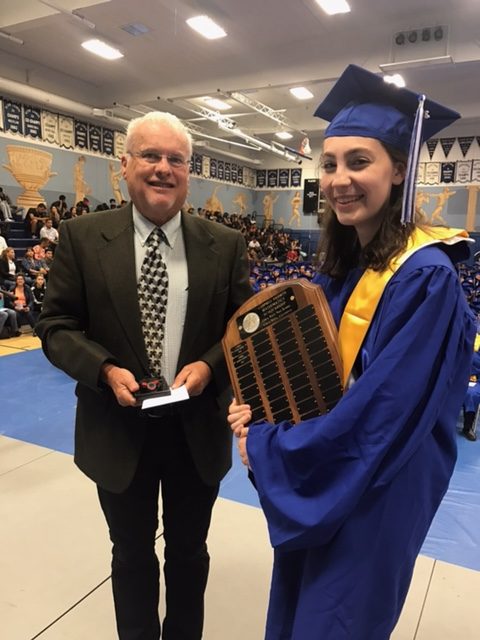Seen to the right is the 2017 winner of the Campbell Naismith Mathematics Award, Emma Salvestrini, presented at Chula Vista High School by Campbell Naismith. This award is made possible by the charitable donation of Mr. Chang Lee, a Chula Vista High School alumni.


Response of Emma Salvestrini to Scholarship Winner Questionnaire
1. I attended a small, private elementary/middle school, and am very grateful to have been taught by an incredible math teacher from sixth to eighth grade – she helped me develop a strong mathematics foundation. However, the most advanced math class you could take as a seventh grader was pre-algebra, and as an eighth grader, regular algebra. Unbeknownst to me at the time, other public middle schools offered geometry to their higher-level-math eighth graders. When I arrived at high school I took accelerated geometry my freshman year, learning that I was a year behind the more advanced kids and that I might not make it to the highest mathematics course my senior year. As I wondered how to change my fate, the district decided to impose a curriculum change to the mathematics courses, and I was placed into Integrated 3 Compact to learn pre-calculus and other important basic math concepts my sophomore year. In effect, I actually skipped a math class that my higher-level math friends labeled as “annoying’ since I went straight to AP Calculus AB for junior year! That class was the highlight of my day and I loved it, so of course I took AP Calculus BC my senior year. I wound up in the highest-level mathematics course, catching up to my peers that began ahead. It was never easy – I spent many hours mulling over equations and I often gave up, ready to ask a million questions in class the next day. But I never ceased to desire to understand. Just spending an hour or so a day trying my best to solve the problems, being okay with the fact that I wasn’t able to correctly answer them all, but striving to understand why, was enough to push my intelligence further and excel in the coursework, while still allowing time for other subjects and activities in my hectic life.
2. As a new first-year university student in my first quarter of college, I decided to take a math class called Math 31A. I understood that I was eligible to skip this class and move further along in my path to completing my required mathematics courses because Math 31A is the equivalent of AP Calculus AB, which I tested out of both during the AP test junior year and the AP test senior year. But I decided that the AP courses I took during high school are very much geared towards the AP exams – meaning I was probably missing some general calculus concepts that the College Board deemed unimportant, but may wind up being essential in subsequent calculus courses. I also figured that in the world of new classes, teachers, students, and routines that I would be stepping into as a college student, I might like to see something familiar and reassuring during my first quarter. I feel as though I chose correctly. The AP Calculus courses I took during high school provided a foundation for the calculus class I am taking now and will aid me in the calculus classes I am set to take in the future by teaching me the basic formulas and concepts. In college, however, I think many professors like to focus on the “why”. So while I might be expected to be bored in Math 31A as I learn the same information for the third time over, I am most definitely not! I am growing to a deeper understanding and learning new mathematical nuances along the way – something the AP exam and its quick approach didn’t allow. As I continue on completing the required mathematics courses and actually learning entirely new techniques and concepts, I know that I will always have my high school mathematics courses to thank for providing a background and more personal experience in mathematics.
3. Four bits of advice: 1 – Do the homework. “Yeah, yeah, yeah, I will” comes out of the mouth of most annoyed students. It’s aggravating, it’s time-consuming, and sometimes, you really just don’t want to. But there’s honestly no way you will understand if you don’t even try. Putting forth just a bit of effort every night, even if it’s only for 20 minutes, means that you’re working your brain towards completing the homework, which brings me to my next point: 2 – it is okay that you can’t solve everything. No really, it’s okay. The homework problems are difficult – on purpose! If you happen to solve them, congratulations! But please don’t think you’re not good at math because you’re stuck, and that you should just give up because you don’t understand. Take a break and come back to the problem(s) if time permits. If not, formulate questions in your mind to ask the next day. It’s normal to not understand every single concept and every single problem! 3 – while it’s okay to not fully understand everything, it’s not okay to stop wanting to understand everything. Don’t allow yourself to simply accept that you didn’t understand – strive to know why, and how you can understand next time. Never let any mathematical confusion just settle. Let the confusion ignite a desire to know more. 4 – ask your teachers and your friends. If you still have questions after class is over, do not be afraid to ask the teacher or your peers for help. I’ve found that most mathematicians and math-inclined people are generally super nice and ready to help! I always loved helping a peer understand if I could – but I can’t help if you don’t ask! The teachers are there for you, and don’t feel like you’re bothering friends if you have questions. To conclude my bits of advice, I will say that you’ll succeed if you want to; if you desire it enough, there is absolutely nothing that will stand in your way of achieving it.